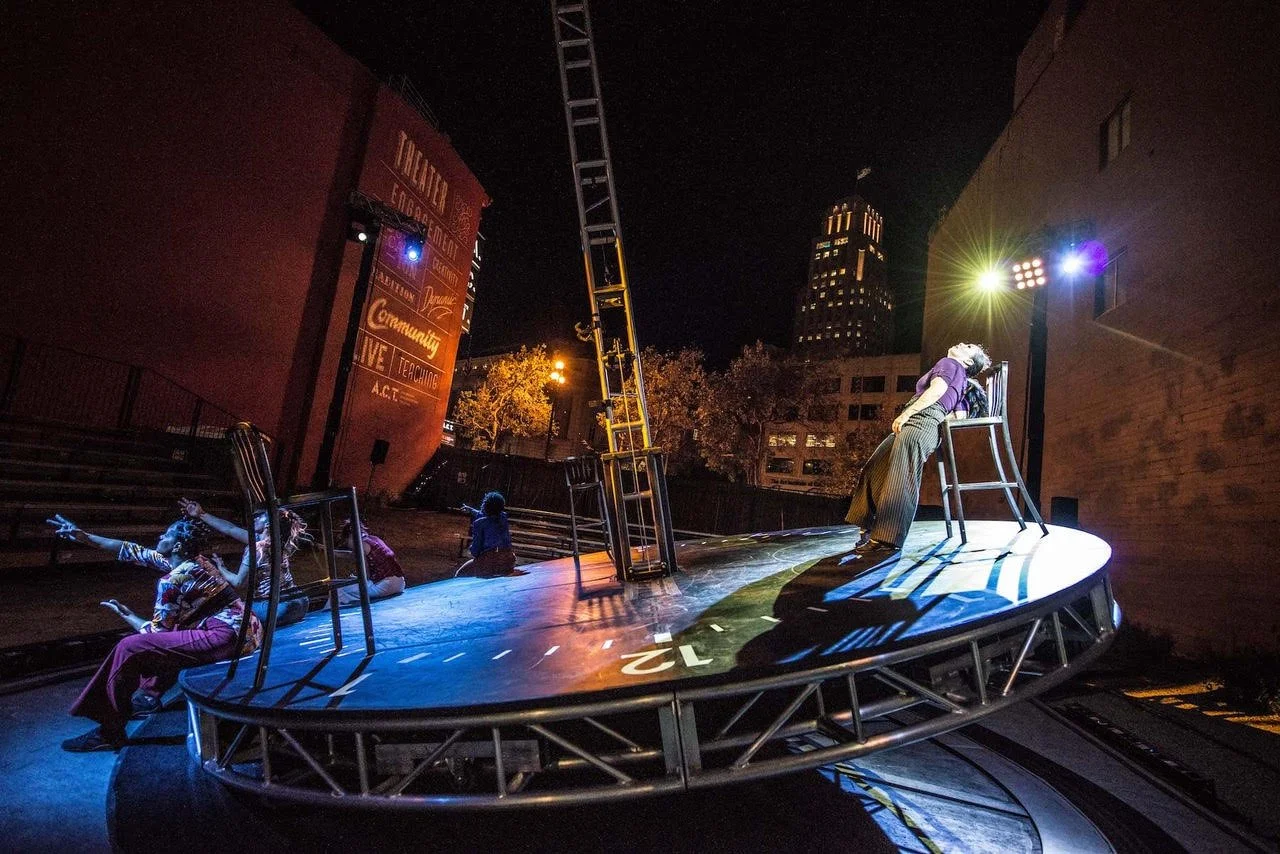"Being impacted by systems of American prisons, courts, probation, and re-entry, I have lived and continue to live a certain kind of taboo. I’m drawn to LABA to see how Jewish thought embraces forgiveness and accountability." Jo Kreiter
"Being impacted by systems of American prisons, courts, probation, and re-entry, I have lived and continue to live a certain kind of taboo. I’m drawn to LABA to see how Jewish thought embraces forgiveness and accountability." Jo Kreiter
JO KREITER
Jo Kreiter is a San Francisco-based choreographer and site artist with a background in political science. She makes large scale public art via apparatus-based dance. She engages physical innovation and the political conflicts we live within. Her work democratizes public space.
Part #1 - LABA PROJECT
winter 2023
PRAYER, an excerpt from IF I GIVE YOU MY SORROWS
Apparatus Based Dance
We often hear the phrase “women in bed.” The phrase can conjure lurid sex, objectification, and misogyny. In this historic moment repressing women’s choices and bodies at the national level, I am reframing women’s beds as a place where our complexity and depth live. Where our bodies transform, grieve, and repair.
IF I GIVE YOU MY SORROWS focuses on the prison bed and engages three activists to explore what women experience in private. The project asks: How is your bed an antidote? What secrets do we leave in our beds? How do our beds hold what is messy, tragic, and grueling?
The excerpt performed this evening, called PRAYER, is danced by natalya shoaf, Sonsheree Giles and Jhia Jackson. Laura Ellis also contributed to the creation of the movement material. Music is by Carla Kihlstedt.
“Don’t let your mouth bring your flesh into guilt.” Ecclesiastes 5.5
*photo: jack Beutler
pictured: natalya shoaf, Sonshere Giles, Jhia Jackson
Part #1 - Explore
Spring 2023
We are 1/3 through the year-long LABA fellowship. Tell me what you are thinking so far about the theme of TABOO and your current project idea inspired by it.
I’ve spent 26 years transforming oral history into public art and ten years working with prison systems-impacted communities. Through creative change, I am connecting systems-impacted individuals and organizations; reclaiming public space for women, including trans women, and enacting public dialogue about prison systems change.
We often hear the phrase “women in bed.” The phrase can conjure lurid sex, objectification, and misogyny. In this historic moment repressing women’s choices and bodies at the national level, I am reframing women’s beds as a place where our complexity and depth live. Where our bodies transform, grieve, and repair.
IF I GIVE YOU MY SORROWS (2023-24) focuses on the prison bed and engages three activists to explore what women experience in private. The project asks: How is your bed an antidote? What secrets do we leave in our beds? How do our beds hold what is messy, tragic, and grueling?
In the project I am looking at a few taboos: the right of women in prison to have a sensual, interior life; How women support themselves, while living in a cage and a prison system that is inherently unsupportive; and addressing questions about harm, repair and restoration.
_____
I am a woman with a formerly incarcerated loved one. I have stood in lines in parking lots surrounded by razor wire in the earliest hours of the day. I have stood with the other America, the one found at the end of long roads in the middle of nowhere:
It could be any kind of gathering. A fourth of July picnic, or Memorial Day. We are all kinds of people. Old Grandmas with walkers. Toddlers in cute little jeans with diapers poking out the back. Surly teens. Eight year olds on the hunt for something to do. Mothers with pinched mouths and bags under our eyes. Priests in a starch white collar. We are young women with tight shirts and a shimmy in our walk. We are mostly brown and black. A few of us are white. We speak several languages at once, and mostly in whispers. But we are not here to celebrate. It's 6:50 in the morning and we are standing outside, in a prison parking lot, in the designated area for visitors. We are cold. We will wait for hours with no bathroom, and nothing in our pockets except a state ID and one car key, if we have been lucky enough to drive here in a rental car. We have traveled for three days across the country. We have moved nearby so we can visit every weekend. We come once a year. We come every Sunday. We have come only once in 5 years. We are scrutinized by the C.O.’s who work Visiting Day. We are shamed for loving someone on the inside.
Being impacted by systems of American prisons, courts, probation, and re-entry, I have lived and continue to live a certain kind of taboo. I’m drawn to LABA to see how Jewish thought embraces forgiveness and accountability.
Photo by Jo Kreiter



